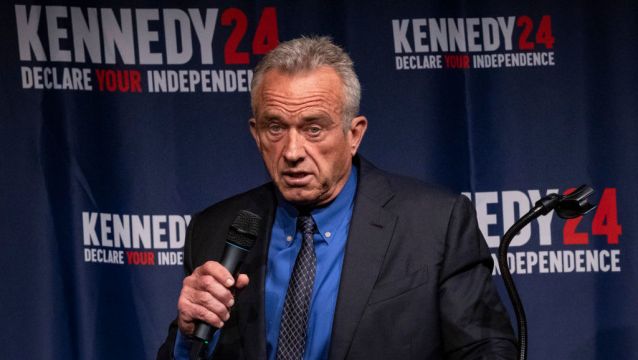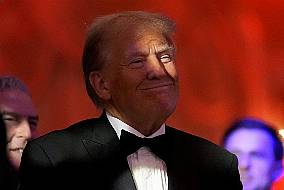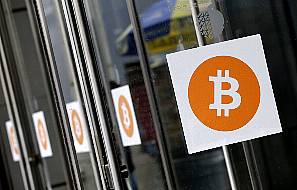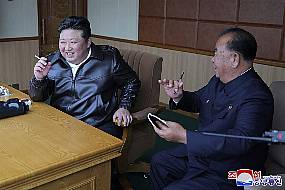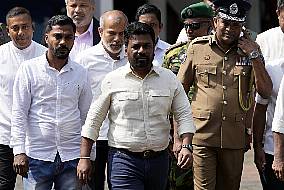Independent US presidential candidate Robert F Kennedy Jr offered staunch support for Israel in a Reuters interview, calling it a "moral nation" that was justly responding to Hamas provocations with its attacks on Gaza and questioning the need for a six-week ceasefire backed by US president Joe Biden.
Mr Biden has also been a vocal defender of Israel since the October 7th attack by Hamas, but he has recently pressured it to stem the humanitarian crisis in Gaza and accelerate a six-week ceasefire for hostage releases and aid delivery.
Asked if he supported a temporary ceasefire in Gaza, Mr Kennedy told Reuters: "I don't even know what that means right now."
Mr Kennedy said that each previous ceasefire "has been used by Hamas to rearm, to rebuild and then launch another surprise attack. So what would be different this time?"
Mr Kennedy, 70, spoke to Reuters in a wide-ranging interview on Monday from his office at his Spanish-style home in Los Angeles, hidden by tropical plants and hedges.
Support for Israel has become a political wedge issue inside the Democratic Party, as the death toll in Gaza tops 30,000 and Israeli prime minister Benjamin Netanyahu vows to push an assault into Rafah.
Mr Kennedy's policy proposals, including a pledge to make homeownership easier and crack down on corporate subsidies, have gained some traction among US voters unenthusiastic about Mr Biden, a Democrat, or his Republican rival Donald Trump in the presidential election.
Mr Kennedy is backed by 15 per cent of registered voters, versus 39 per cent for Mr Biden and 38 per cent for Trump, according to a recent Reuters/Ipsos poll.
RFK Jr to impact 2024 election
That level of support means Mr Kennedy could have a significant impact on the election in November, with strategists claiming he could help Mr Trump by pulling more votes from Mr Biden. He will announce a running mate on March 26th; names floated include football player Aaron Rodgers, who refused the Covid vaccine, lawyer Nicole Shanahan and US senator Rand Paul.
His opposition to a ceasefire and his full-throated support for Israel could be at odds with many young voters, whom he counts as one of his strongest constituencies.
Speaking from an office crammed with bookshelves, taxidermied animals and insect specimens, Mr Kennedy told Reuters he sees wars as either moral crusades that should be pursued or wars of choice that should be avoided.
World War I was an immoral war. It was a war of choice. We should have never gone.
"World War I was an immoral war. It was a war of choice. We should have never gone," he said.
Israel did not choose this war, he said, comparing it to US involvement in World War II after the attack on Pearl Harbor.
Mr Kennedy said Hamas was to blame for Gaza's destruction for failing to embrace a two-state solution and for firing thousands of missiles into Israeli cities like Tel Aviv.
"Any other nation that was adjacent to a neighbouring nation that was bombing it with rockets, sending commandos over to murder its citizens, pledging itself to murder every person in that nation and annihilate it, would go and level it with aerial bombardment," Mr Kennedy said.
"But Israel is a moral nation. So it didn't do that. Instead, it built an iron dome to protect itself so it would not have to go into Gaza."
He said Hamas gave Israeli leaders no choice after fighters stormed into Israel on October 7th, killing 1,200 people and capturing 253 hostages, according to Israeli tallies.
Mr Kennedy added that he thinks a US president should be contacting leaders from Russia, Turkey and Egypt to put an end to Hamas.
Since the October 7th Hamas attacks, nearly 32,000 people have been confirmed killed in Israel's retaliatory onslaught, according to Palestinian health officials, with thousands more feared lost under the rubble.
A UN-backed report on Monday said famine in Gaza is likely by May without an end to fighting in the more than five-month war between Israel and Hamas militants in the Palestinian enclave of 2.3 million people.
Political costs are irrelevant.
Mr Kennedy, an environmental lawyer who spent years pushing anti-vaccine messages, told Reuters as president he would not restrict abortion, would repeal many provisions of Mr Biden's signature Inflation Reduction Act (IRA), and would look to close down the southern border to immigrants entering the US illegally, while people with asylum claims will await adjudication in Mexico.
He distanced himself from Mr Trump, but said he supported a recent Supreme Court decision that allowed the former president to remain on the ballot in 2024.
"I intend to beat him in this election. I want to beat him on a level playing field. I don't want to beat him because of a court case," he said.
Mr Kennedy said he considered many subsidies in the IRA "absolutely catastrophic for the environment."
"You know, virtually all the carbon capture subsidies are really giant subsidies to the oil industry and to the carbon industry. We should not be doing that. We shouldn't add to big agriculture ... I would get rid of those altogether," he said.
He spoke in front of a taxidermied tiger that was a gift to his late father from Indonesia's late president Sukarno. On his bookshelves were skulls of various animals, dead spiders in vials and a stream of wooden ducks, some antique and some passed down from his father, the senator and presidential candidate Robert F Kennedy who was assassinated in 1968.
The bookshelves featured photograph archives of his uncle, former president John F Kennedy, as well as books about the US Central Intelligence Agency, and classics like Lewis Carroll's Alice's Adventures in Wonderland.
Covid misinformation
Mr Kennedy was banned from Instagram in 2021 for spreading misinformation about vaccines and the Covid-19 pandemic, but was later reinstated. He lost a legal bid to force YouTube owner Google to reinstate videos of him questioning the safety of Covid vaccines.
He disputes the anti-vaccine tag, but chaired the Children's Health Defense, a nonprofit organisation that focuses on anti-vaccine messaging. He said as president, he would not prevent people from getting vaccines, but he did not answer a question about how he would prevent an uptick in measles cases.
"I'm not concerned about whether people disagree with me," Mr Kennedy said in response to a question on how his position on Gaza might affect his standing among young voters.
"If somebody shows me that I'm wrong about an issue, I'm going to change my opinion."
Reuters/Ipsos polls show Mr Kennedy backed by 16 per cent of respondents aged 18 through 39, versus 28 per cent for Mr Biden and 26 per cent for Mr Trump.
Fifteen percent of respondents aged 40 or older said they supported Kennedy Jr, versus 33 per cent for Mr Biden and 36 per cent for Mr Trump.
